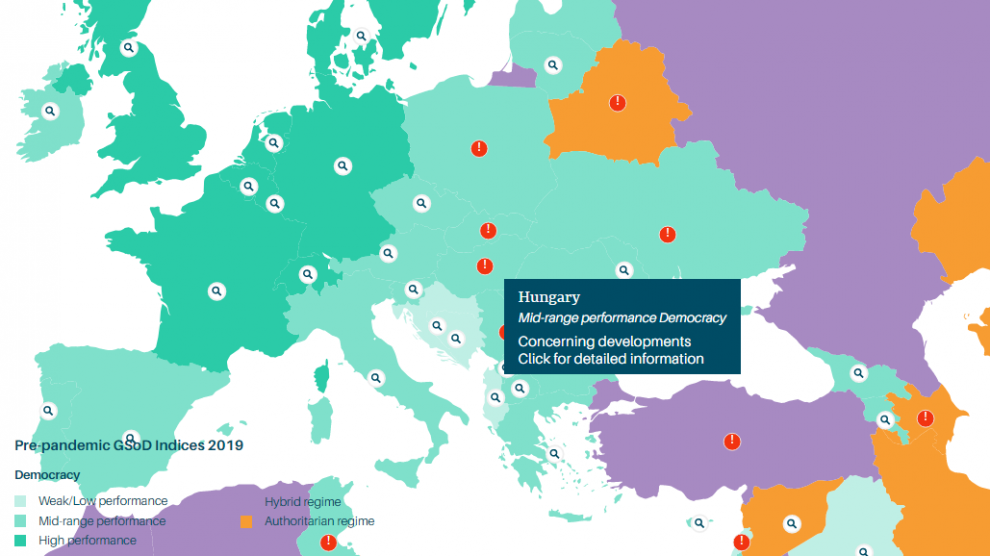The Covid-19 pandemic is not just a global public health crisis. It has huge implications for democracies and fundamental rights around the world.
Some governments are restricting civil liberties, freedoms, discriminating in enforcement of pandemic-related measures, limiting parliamentary and civic oversight, and exploiting opportunities for executive aggrandizement in the name of fighting the pandemic. Many governments are restricting human rights and fundamental freedoms, such as the freedoms of assembly and of movement. While certain restrictions can be justified under international law, notably if they are lawful, necessary, proportionate, subject to review and of limited duration, it is paramount that they are lifted once the Covid-19 outbreak is over.
Worryingly, the pandemic appears to be the pretext for repressive measures against critical or opposition voices or religious, ethnic, or sexual minorities.
Policy-makers, academics, civil society and journalists are searching for ways to both understand the crisis and its ramifications, as well as finding the right policy solutions in this unprecedented situation. But accurate, trustworthy and clear information can be hard to come by.
Launched on July 7, the Global Monitor of Covid-19’s Impact on Democracy and Human Rights, put together by the International Institute for Democracy and Electoral Assistance (International IDEA), and other trackers of democratic rights, aims to be just that: a one-stop platform that facilitates public access to knowledge, information, data, analysis and policy guidance for the 162 countries included in International IDEA’s Global State of Democracy Indices.
“The Covid-19 pandemic threatens not just our public health but the state of our democracies around the world,” said International IDEA Secretary-General Kevin Casas-Zamora. “The Global Monitor gives journalists, policymakers and civil society activists the ability to hold governments to account by tracking their policy responses and identifying where our basic rights are backsliding, whether because regular elections, civic action or independent media are being trampled upon.”
“Trustworthy, accurate and clearly presented information is more important than ever in this crisis. This tracker provides the tool,” added Casas-Zamora.
The Global Monitor platform is produced in the form of an online world map with links to country and regional profiles containing detailed data, analysis and an assessment of which measures and actions should be watched or represent a concern from a democracy and human rights perspective.
According to the monitor, nine of emerging Europe’s 23 countries currently have concerning developments from a democracy and human rights perspective which can be directly related to the Covid-19 pandemic: Azerbaijan, Belarus, Bulgaria, Hungary, Poland, Romania, Serbia, Slovakia and Ukraine.
In Azerbaijan, there is concern that the lockdown and other stringent measures undertaken by the government are at risk of becoming means to stifle dissent and crack down on government critics. This will have an impact on civil liberties and can lead to further autocratisation of the regime.
In Belarus, the president and the government downplayed the dangers of the pandemic and questioned the benefits of a large-scale lockdown. In the run up to the presidential elections scheduled for August 9, the regime has continued to clamp down on opposition politicians and critics, arresting dissidents and opposition supporters.
In Bulgaria, the authorities’ strategy to combat the virus raises concerns about the proportionality of measures, in particular, in relation to the protection of personal data and the discriminatory treatment of Roma communities.
A major cause of concern in Hungary has been the rule by decree by the executive, further expanding executive power, undermining checks on Government and potentially further deepening the country’s democratic backsliding process.
In Poland, where presidential elections were held on June 28, the monitor notes that political campaign activity was restricted due to the pandemic and that the public broadcaster “failed to ensure balanced and impartial coverage, and rather served as campaign tool for the incumbent”.
In Romania a ruling by the Constitutional Court that there is no need for parliament’s approval to declare or extend a state of alert needs to be watched, to ensure that checks on government are not further weakened.
Aspects of concern in Slovakia include the quarantine measures imposed on Roma communities and the use of surveillance apps to combat the virus.
Democratic consolidation in Ukraine might be affected by the pandemic. The use of personal data without consent is a serious concern, while freedom of speech needs to be watched due reports of journalists being threatened or attacked during the pandemic.
—
Unlike many news and information platforms, Emerging Europe is free to read, and always will be. There is no paywall here. We are independent, not affiliated with nor representing any political party or business organisation. We want the very best for emerging Europe, nothing more, nothing less. Your support will help us continue to spread the word about this amazing region.
You can contribute here. Thank you.








[…] Unele guverne restricționează libertățile civice, discriminează prin modul de aplicare al măsurilor legate de pandemie, limitează puterea de control a parlamentului și cetățenilor și exploatează ocazii de expansiune a puterii executive în numele luptei cu virusu, potrivit emerging-europe.com […]